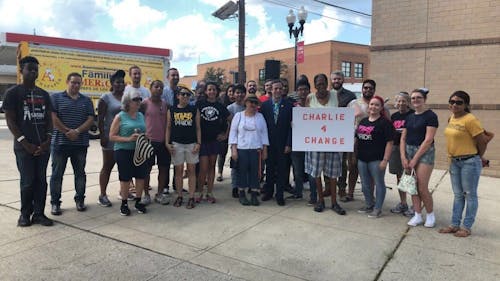Rutgers alumnus, mayoral candidate plans on raising New Brunswick government worker wages upward of $15 hourly

Rutgers alumnus and local journalist Charlie Kratovil never expected he would run for mayor, let alone against incumbent James Cahill, who held the position in 2009 when Kratovil still attended Rutgers University.
Kratovil, who created and serves as editor of New Brunswick Today, has been reporting on crime, public safety and city government since 2011. He announced his mayoral candidacy earlier this year, and it is the first time since 2006 that an independent candidate is challenging Cahill and the first electoral challenge to the incumbent mayor since 2010, according to New Brunswick Today.
“... In order for us to have a democracy, we need competitive elections with candidates who are trying hard to make the city better, and I was just ultimately super disappointed in 2014 when no one ran against the mayor in the primary or the general election,” he said.
On Monday, Kratovil stood in front of the Rutgers Public Safety Building, surrounded by a crowd of supporters, to discuss his campaign and plans to raise the minimum wage for workers employed by the New Brunswick city government if elected in November.
“I personally believe that we need to raise wages for all workers. The minimum wage here is way too low. It’s virtually impossible to survive here on $8.60 an hour,” he said. “I did a lot of research, filed OPRA (Open Public Records Act) requests and ultimately looked into what it would cost to raise these wages, and I think it’s a worthwhile thing that can be accomplished by way of a city ordinance.”

As of July 1, New Brunswick's city government employed approximately 150 workers at wages of less than $15 per hour, Kratovil said.
His plan is to incrementally increase wages for these workers over the next three years, arriving at a minimum of $15 hourly wage by 2021.
For those making minimum wage currently, their pay would increase to $12 an hour right away, he said. By 2020, they would make $13.50 an hour and $15 an hour by 2021. Everyone making less than $20 an hour currently would see some sort of raise during the three-year period.
"By combining our police and fire departments into a unified public safety department, as well as eliminating the New Brunswick Parking Authority, we will save more than enough money to fund these raises without creating a budget imbalance," he said.
Kratovil also cited his campaign’s most recent accomplishment, connecting New Brunswick’s emergency dispatch services with the University’s own, thus avoiding privatization, an idea he said he lobbied for.
“As of last week, the city of New Brunswick’s 911 calls are now being fielded at the state-of-the-art facility (the Rutgers Public Safety Building) right behind me,” he said.
Kratovil celebrated the success of transitioning eight New Brunswick dispatchers into salaried Rutgers staff positions while maintaining the benefits of working in the public sector.
“Because we defeated this attempt at privatization, when seconds count no time will be wasted by connecting your emergency call to a private, out-of-state corporation whose workers may not be qualified or familiar with the complex geography of our great city,” he said.
Kratovil takes pride in his Rutgers roots.
Kratovil said that he supports groups such as the Rutgers chapter of United Students Against Sweatshops (USAS) in their fight to raise worker minimum wages on campus to $15 hourly.
If elected, he plans on working with the University to strengthen its relationship with the city of New Brunswick, he said.
“That’s actually one of the reasons we started the newspaper (New Brunswick Today), was to help educate people on each side of that divide, about what’s going on on the other side,” Kratovil said.
Editor's Note: This story had been updated to better reflect Kratovil's plan.



